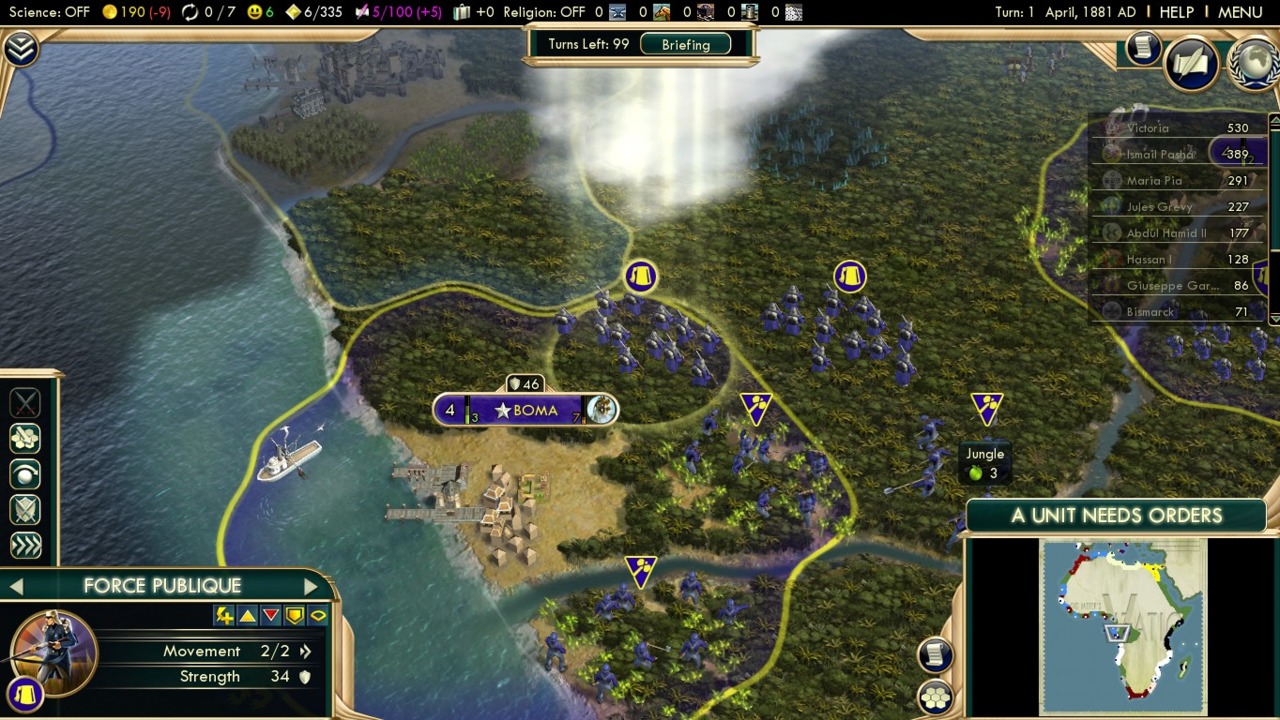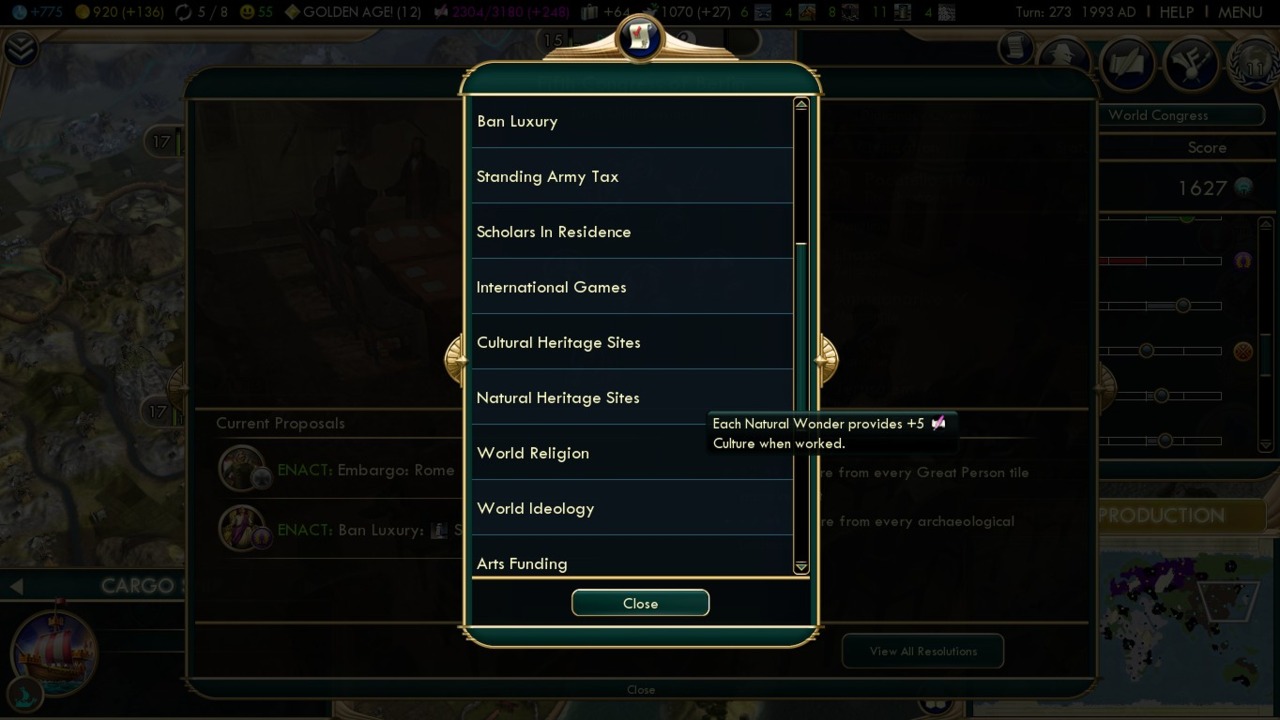Civilization wears a special mantle within the realm of strategy games. As one of the first games in the genre and a progenitor of the 4X style, it not only spawned one of the most popular strategy franchises but also one of the most influential. Sid Meier's Civilization V took many core elements of gameplay back to their roots, retooling and refining them in an attempt to modernize the aging mechanics. It was a somewhat controversial move, stripping out much of the complexity that fans had come to expect, but after both Gods & Kings and Brave New World, the full beauty and elegance of what Firaxis has done is readily apparent. With exceptionally clever additions to many of the weakest areas of past entries, Brave New World isn't just the best Civilization has ever been; it stands as one of the most expertly crafted strategy games in recent memory.

Probably one of the biggest changes is Brave New World's inclusion of trade routes. In the past, international trade was handled solely by agreements between two heads of state and formed the core of the game's diplomacy system. Now, trade routes establish the new foundation for international relations. You have the option of building caravans and cargo ships and then either shipping supplies to and from your own cities or trading with other rulers and city-states. Distant civilizations and those with different luxury resources yield higher profits, but are vulnerable targets for hostile forces. Significant investment is necessary to reliably safeguard your income sources during the early game, but the trade-offs can be highly beneficial.
Much like the soft power exercised by real-world economic cooperation, the full potential of trade is elegantly subtle. Science, religious influences, and some cultural effects are also transferred via trade routes. If, for example, your civilization is significantly more advanced than the one with which you are trading, your advantage slowly begins to disappear as your trade route grants huge research bonuses to your trade partner. Similarly, religious pressure is transferrable and can be used to great effect if you're looking for a clever method of picking up converts. Additionally, if your favored stratagem in Civilization revolves around rapid expansion of your empire, then internal trade routes can be used to transfer food and production resources to new cities, allowing you to rapidly build up defenses and boost population growth.
Cargo ships are worth quite a bit more to raiders than caravans, and historically, merchant fleets have been the fuel of the world's mightiest powers. The oceans can be a big place, however, and even in the later stages of the game when you have aircraft carriers and battleships at your disposal, guarding several thousand miles of transoceanic routes can be taxing. What it does do, however, is provide a rare excuse to build and maintain powerful naval forces. This update not only brings Civilization in line with one of the more critical elements of history, but it does so in such a fun, unique, and genuinely creative way that the whole system couldn't feel more natural and fundamental to play.

The second major addition to the Civilization feature set is tourism. As an expansion of culture, tourism fundamentally alters one of the game's many win conditions. In previous iterations of Civilization V, cultural victories were handled in an incomplete way. Culture-producing buildings, wonders, and great persons would drive social innovation, allowing you to select new policies that gave your civilization certain bonuses supporting different strategies and play styles. After five social ideas had been completely adopted, you could start the Utopia Project and claim victory. While fun as a sort of idealized method of establishing global domination, the Utopia Project was very difficult to defend against, requiring either a powerful military action or a dramatically superior cultural output to be quickly developed--neither of which is easy at any stage of the game.
With Brave New World, that system has been retooled. Culture still allows for social innovation and the adoption of new, beneficial policies, but they are no longer the real key to a victory; they're simply a decent gauge of progress. A culture win now requires that your civilization hold significant sway over the majority of other civs in play. By fostering a society that creates great painters, musicians, and writers, and then displaying those works publicly in museums and theaters, you compete with others for the attention of the global community; the greater your influence, the closer you are to a win. Buildings, units, and various other features have all been added to support this play style and, most importantly, to help prevent other players from winning too quickly.
Later in the game, you have access to ideologies, which are three expanded trees that can help you further refine the focus of your nation. Freedom, order, and autocracy all support different strategies and play a role in diplomacy. Freedom is focused on helping more great writers, artists, and musicians find their way in your society. Order gears your civilization for raw industrial output and can help fuel a powerful war machine. Autocracy establishes a rigid social structure that can help you focus your society on the creation of wealth, science, and expansion. Countries with matching ideologies receive bonuses to trade and tourism on both sides, while those with opposing perspectives suffer penalties. Changing ideologies is difficult without a dissatisfied citizenry, but with some planning and basic information on your rivals, careful choices can help prevent other countries from gaining too much cultural influence.

New systems for managing great works, as well as the completely new archaeology mechanic, reinforce these ideologies. In Brave New World, most artists no longer produce one-off boosts to culture; instead, they create great works, modeled after real paintings, songs, or literary works from history. As your civ creates new great artists, they demonstrate the creative output of your country to the world. Paintings can be put on display in museums to help attract tourists, musicians can go on concert tours or create masterpieces that echo through your orchestra halls, and writers can compose a political treatise for a one-time culture bonus, or their work can be showcased in amphitheaters or art houses and used to help increase tourism.
Unlike most units, archaeologists can operate well outside their national borders and can construct temporary tile improvements and archaeological digs in foreign territory. Once discovered, these artifacts can either be returned to their "rightful" owners or taken to bolster your own country. Reflective of the tradition of cultural plundering on the part of quite a few European nations throughout history, within the context of Civilization, these units can be used to prevent cultural warfare or as gestures of good will. It's a small addition, but it helps reinforce the new cultural victory mechanics and the final major gameplay change: the revamped diplomacy system.

One of Civilization V's biggest changes was the inclusion of city-states, miniature nations that could ally themselves with another civ and grant minor bonuses as well as militaristic or trade options. To achieve a diplomatic victory, you needed to win an election in the United Nations and be appointed the secretary-general. City-states played a role, and well-managed relationships yielded bonuses easing that path. Brave New World takes all of those gameplay tweaks and dramatically expands upon them, yielding what may very well be the most full-featured diplomacy system seen in a game like this.
Once any given civilization has researched the printing press and has discovered every other player on the map, the World Congress is established. After a variable number of turns, the congress is convened again to consider resolutions, sanctions, and global projects like a World's Fair or the International Space Station. Each time the congress meets, you are given a number of delegates based on your alliances with city-states, your status as a host of the conference, and the current global era. The civ that discovers the others is always the first host of the congress and receives a huge advantage in setting the tone for diplomatic relations moving forward. This is a substantive expansion of the rules governing diplomatic victory, and it establishes the World Congress and, later, the United Nations as a full-featured mechanic with a purpose beyond determining a winner.
City-states receive a huge boost in terms of relevance, for example, because your relationships with them determine what resolutions you can pass or what you can block from other civs. Voting is public as well, so committing delegates to one or another policy can help forge or break alliances. Certain proposals, such as those for new congress hosts and the establishment of a world leader, must be called by a city-state, preventing abuse on the part of players. Steamrolling too many of the tiny city-states not only makes diplomatic victory impossible for you, but could lead to huge sanctions limiting trade, removing access to your luxury resources, or severely crippling your military power by imposing an international tax on standing armies.

Beyond the additions to diplomacy, culture, and trade, Brave New World comes with eight new wonders, nine new civilizations, and about a dozen new units. Each of them brings a bit more to the already staggering amount of content contained in the core game as well as Gods & Kings. These additions don't affect all that much, but the new civs are built to take advantage of the updated mechanics, and they reinforce the overall theme of the expansion. It is, however, a little disappointing that not all of the content from Gods & Kings is included, most notably the civs that are unique to that expansion. If you have Gods & Kings, you will have access to everything, but if you skipped out, Brave New World isn't all-inclusive.
Further refinements to the AI have yielded more-cautious opponents that actively seek to exploit your weaknesses throughout the game. Careful diplomacy is necessary to successfully navigate the potential minefield of political opponents and also prevent any one nation from gaining too much influence in the World Congress. Still, if you're too aggressive, you're likely to draw the attention and ire of other civs who will actively aim to cripple your civilization through embargoes, sanctions, or any number of other political actions. Victory is much harder and requires more careful management of the image of your civ and its place in the world.
Beyond the open-ended single-player "campaigns" and multiplayer matches that have become the staples of the series are various prebuilt scenarios chronicling specific eras of history. Brave New World features two such modes covering the American Civil War, and the second European wave of colonization and the Scramble for Africa. As the peoples of the world are still struggling to slough off the legacy of the late 19th century, these scenarios offer a tasteful, informative, and fun perspective on humanity's ambivalent relationship with colonialism, imperialism, and human exploitation.

Civilization has always been a big game, seeking to encompass the entire span of human history, from the advent of agriculture and animal husbandry to the exploration of space. The game is a monument to humankind, both its triumphs and its sins. Brave New World taps into some of the darkest chapters of the long and storied history of our species, but presents them with respect, reverence, and a distinct sense of optimism for our uncertain future. This expansion is a fantastic accomplishment, and one that finally fulfills all of the potential of this chapter of the series.